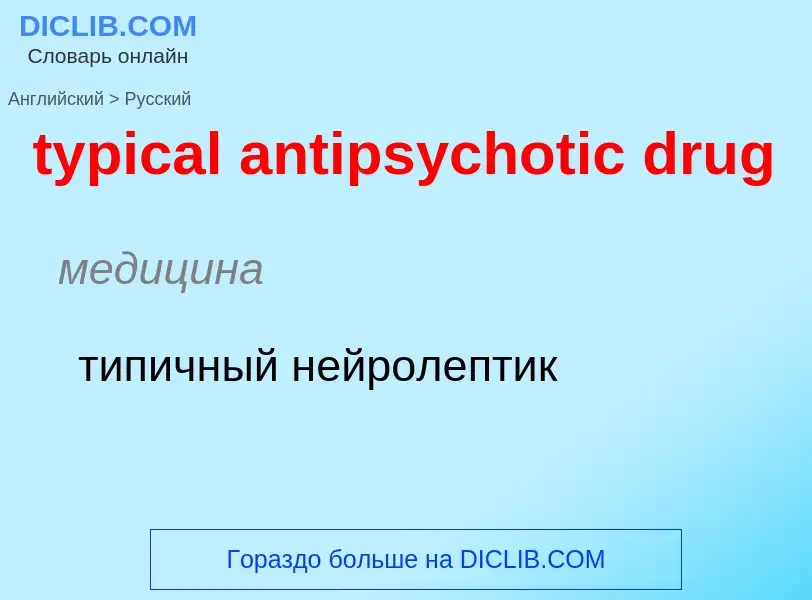Übersetzung und Analyse von Wörtern durch künstliche Intelligenz ChatGPT
Auf dieser Seite erhalten Sie eine detaillierte Analyse eines Wortes oder einer Phrase mithilfe der besten heute verfügbaren Technologie der künstlichen Intelligenz:
- wie das Wort verwendet wird
- Häufigkeit der Nutzung
- es wird häufiger in mündlicher oder schriftlicher Rede verwendet
- Wortübersetzungsoptionen
- Anwendungsbeispiele (mehrere Phrasen mit Übersetzung)
- Etymologie
typical antipsychotic drug - Übersetzung nach russisch
медицина
типичный нейролептик
[nju(ə)rə'leptik]
фармацевтический термин
нейролептик
транквилизатор
нейролептический
успокаивающий
снимающий возбуждение
нейроплегик
антидиарейное средство
антипсихотическое средство
нейролептическое средство
прилагательное
фармацевтический термин
нейролептический
успокаивающий
снимающий возбуждение
существительное
[nju(ə)rə'leptik]
фармацевтический термин
нейролептик
транквилизатор
[æntisai'kɔtik]
медицина
антипсихотический
снимающий или предотвращающий приступы психоза
фармацевтический термин
нейролептик
нейроплегик
антипсихотическое средство
нейролептическое средство
прилагательное
медицина
антипсихотический
снимающий или предотвращающий приступы психоза
Definition
Wikipedia
Typical antipsychotics (also known as major tranquilizers, and first generation antipsychotics) are a class of antipsychotic drugs first developed in the 1950s and used to treat psychosis (in particular, schizophrenia). Typical antipsychotics may also be used for the treatment of acute mania, agitation, and other conditions. The first typical antipsychotics to come into medical use were the phenothiazines, namely chlorpromazine which was discovered serendipitously. Another prominent grouping of antipsychotics are the butyrophenones, an example of which is haloperidol. The newer, second-generation antipsychotics, also known as atypical antipsychotics, have largely supplanted the use of typical antipsychotics as first-line agents due to the higher risk of movement disorders in the latter.
Both generations of medication tend to block receptors in the brain's dopamine pathways, but atypicals at the time of marketing were claimed to differ from typical antipsychotics in that they are less likely to cause extrapyramidal symptoms (EPS), which include unsteady Parkinson's disease-type movements, internal restlessness, and other involuntary movements (e.g. tardive dyskinesia, which can persist after stopping the medication). More recent research has demonstrated the side effect profile of these drugs is similar to older drugs, causing the leading medical journal The Lancet to write in its editorial "the time has come to abandon the terms first-generation and second-generation antipsychotics, as they do not merit this distinction." While typical antipsychotics are more likely to cause EPS, atypicals are more likely to cause adverse metabolic effects, such as weight gain and increase the risk for type II diabetes.

![Advertisement for Thorazine ([[chlorpromazine]]) from the 1950s, reflecting the perceptions of psychosis, including the now-discredited perception of a tendency towards violence, from the time when antipsychotics were discovered<ref>The text reads: "When the patient lashes out against 'them' - THORAZINE (brand of chlorpromazine) quickly puts an end to his violent outburst. 'Thorazine' is especially effective when the psychotic episode is triggered by delusions or hallucinations. At the outset of treatment, Thorazine's combination of antipsychotic and sedative effects provides both emotional and physical calming. Assaultive or destructive behavior is rapidly controlled. As therapy continues, the initial sedative effect gradually disappears. But the antipsychotic effect continues, helping to dispel or modify delusions, hallucinations and confusion, while keeping the patient calm and approachable. SMITH KLINE AND FRENCH LABORATORIES leaders in psychopharmaceutical research."</ref> Advertisement for Thorazine ([[chlorpromazine]]) from the 1950s, reflecting the perceptions of psychosis, including the now-discredited perception of a tendency towards violence, from the time when antipsychotics were discovered<ref>The text reads: "When the patient lashes out against 'them' - THORAZINE (brand of chlorpromazine) quickly puts an end to his violent outburst. 'Thorazine' is especially effective when the psychotic episode is triggered by delusions or hallucinations. At the outset of treatment, Thorazine's combination of antipsychotic and sedative effects provides both emotional and physical calming. Assaultive or destructive behavior is rapidly controlled. As therapy continues, the initial sedative effect gradually disappears. But the antipsychotic effect continues, helping to dispel or modify delusions, hallucinations and confusion, while keeping the patient calm and approachable. SMITH KLINE AND FRENCH LABORATORIES leaders in psychopharmaceutical research."</ref>](https://commons.wikimedia.org/wiki/Special:FilePath/Thorazine advert.jpg?width=200)
